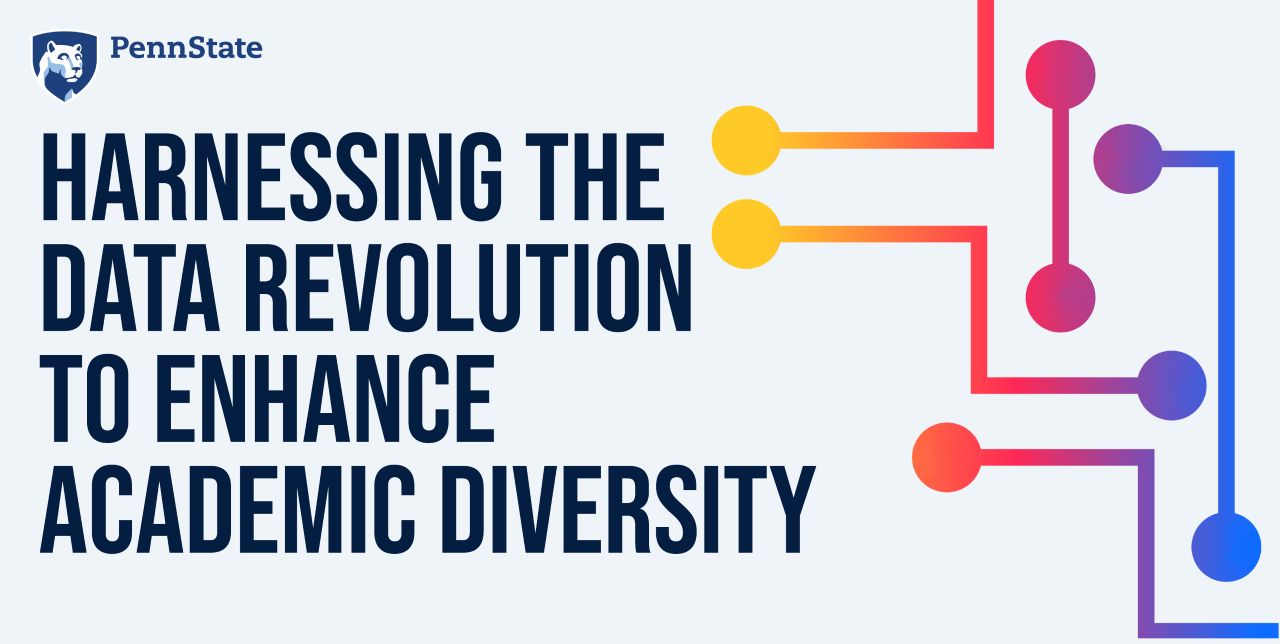
Data science can improve diversity -- diversity can improve data science.
Using data science to boost diversity, using diversity to boost data science
Posted on May 6, 2021Institute for Computational and Data Sciences-led symposium explores challenges, opportunities to improve data science equity
UNIVERSITY PARK, Pa. — Data science can only be data science for good when it can be data science for all.
That was the message of “Harnessing the Data Revolution to Enhance Diversity,” a symposium that explored the issues of — and opportunities in — using data science to improve equity and diversity in academia and in society. The participants also expressed taking the next steps toward that improvement.
Jenni Evans, professor of meteorology and atmospheric science and director of the Institute for Computational and Data Sciences (ICDS), which sponsored the symposium, told participants that data science and the tools of data science, artificial intelligence (AI) and machine learning, may be critical in advancing understanding of these challenges.
“With insight, these analyses could contribute insights to inform a more fair and equitable society but, used incorrectly, these tools could perpetuate the very ills they are trying to alleviate,” she said.
“It is the human element that creates challenges for studying diversity, often because of hidden or unrecognized biases that can have a ripple effect,” Evans explained. “We are now in a time when AI, complex data analytics and computing methodologies are being used for identifying new pharmaceuticals and galaxies. We are still in a relatively nascent state of applying these tools to the human sphere and we have much to learn. Algorithmic and empirical models are only as good as the data they are built on, and so can be used — inadvertently or even intentionally — to perpetuate inequities in our society or, more optimistically, to gain critical insights into these realms.”
The symposium, held in partnership with Penn State’s Office of the Vice Provost for Educational Equity and the Center for Social Data Analytics, attracted more than 232 attendees from 20 different universities.
“The importance of diversity within research extends beyond opportunities and access. It transcends individual perspectives and thought and recognizes that creativity, knowledge generation, and problem solving, can be approached from a multitude of directions.”
Lora Weiss, senior vice president for research, Penn State, who introduced the second day of the symposium, said that diversity is vital to the success of the research community.
“The importance of diversity within research extends beyond opportunities and access. It transcends individual perspectives and thought and recognizes that creativity, knowledge generation, and problem solving, can be approached from a multitude of directions,” said Weiss.
Weiss said that not only can diversity expand research collaborations and deepen scientific understanding, but also it has personal benefits.
“You will meet new collaborators, you will be invigorated to think in new directions and come up with new creations, and you will make new lifelong friends,” she told the group.
Diversity and demographics
Kathleen Bieschke, Penn State’s vice provost for faculty affairs, said that using data science to inform diversity initiatives has been critical to the University’s success, creating positive social impacts on its campuses across Pennsylvania and around the world.
“At the start of his tenure in 2014, President Eric Barron mapped out six presidential imperatives for Penn State to be a truly modern University, one of which was called ‘Diversity and Demographics,’” Bieschke said. “Since then, Penn State’s commitment to diversity, equity and inclusion has become a moral, educational and business imperative across the University.”
She added that learners from underrepresented groups currently represent 13.6% of the Penn State student population, up 3.8% since 2018.
Speakers and collaborations
The seminar featured 10 speakers from across the U.S. who discussed diversity-related issues and approaches that have and haven’t worked in academia. Speakers included:
- Jeff Adams, associate vice president and associate dean for undergraduate education, Penn State
- David Smith, associate dean for advising and executive director, Division of Undergraduate Studies, Penn State
- Richard Arum, dean of the school of education and professor of sociology and education, University of California Irvine
- Ashley Patterson, assistant professor of education, Penn State
- KerryAnn O’Meara, professor of higher education and special assistant to the president for strategic initiatives, University of Maryland
- Adriane Randolph, professor of information systems, Kennesaw State University
- Sarah Rajtmajer, assistant professor of information sciences and technology, Penn State
- Mary Murphy, professor of psychological and brain sciences, Indiana University
- Tim Renick, professor of religious studies and vice provost and vice president for enrollment management and student success, Georgia State University
- Daniel Susser, assistant professor of information sciences and technology, Penn State
- Fay Cobb Payton, professor of information technology and business analytics, North Carolina State University
During the discussions, these presenters offered insights into both how data science can improve equity, and how institutions can attract and retain diverse data scientists.
Attracting, retaining, promoting diverse talent
One of the key areas covered during the two-day event was the need for more diversity in the data science community. Randolph said that attracting diverse talent is just the first step. The community also needs to retain and promote that talent in institutions.
Randolph briefed participants on a program, “ImPACT IT: Increasing the Participation of Women in Information Technology.” The program relies heavily on data to achieve its mission of addressing the lack of gender equity within the information systems academic areas and increasing the number of women in those areas. It also seeks ways to increase the number of women who achieve the rank of full professor.
She said the effort to create more gender equity in information systems will positively impact the society broadly.
“We cannot solve issues from one single lens. There is no such thing, as [poet] Audre Lorde tells us, as a single-issue struggle because we don’t live single-issue lives, which is a guiding mantra for us,” said Randolph.
